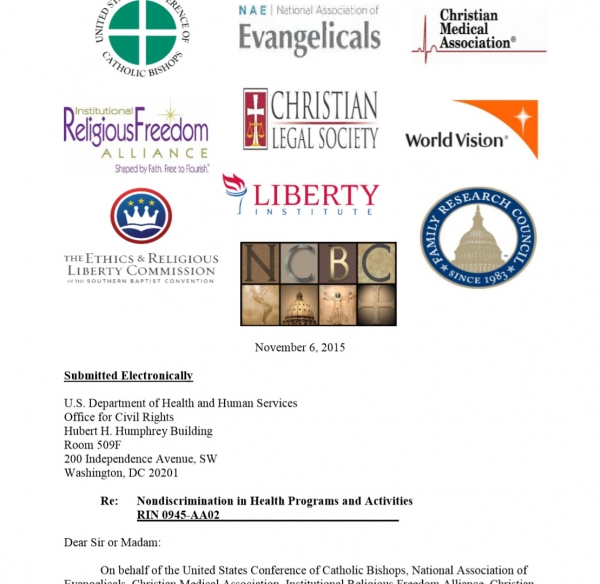
Screenshot of the joint letter submitted to the Department of Health and Human Services Office for Civil Rights.
A proposed Office of Civil rights regulation on nondiscrimination in health care elicited concern from religious groups regarding the effect the proposal will have on religious liberty.
On November 6, the National Association of Evangelicals, the Ethics and Religious Liberty Commission of the Southern Baptist Convention, Institutional Religious Freedom Alliance, World Vision (US), Family Research Council, United States Conference of Catholic Bishops, and other religious organizations submitted their comments on the Department of Health and Human Services Office of Civil Rights’ proposed nondiscrimination rule to implement Section 1557 of the Affordable Care Act.
The purpose of Section 1557 is to broaden the nondiscrimination policy regarding health care coverage, which would require religious organizations to perform actions that go against their religious beliefs, like providing abortion referrals or pay for gender transition related costs, according to the letter the religious organizations sent the Office of Civil Rights.
"We agree that the prevention of sex discrimination in health programs and activities is a laudable statutory goal. Everyone should have access to health care and health coverage," read the letter.
The religious organizations’ concern surrounds the basis on which the proposed rule defines “sex discrimination” which includes “discrimination based on ‘termination of pregnancy,’” “discrimination based on ‘gender identity,’” and “discrimination based on the sex of a person with whom an individual has a ‘relationship or association.’”
“This expansive definition of sex discrimination lacks support in the language and legislative history of Title IX, and is likely to have a detrimental effect on the privacy interests of patients, to interfere in some instances with the effective delivery of health care services, and to infringe upon the religious and moral convictions of health care providers, insurers, and other stakeholders.”
Hence, the religious organizations assert that the regulations under Section 1557 must have exemption for those with religious objections.
“We believe that the changes urged in this letter are critical and that without them, the regulations are unlikely to survive scrutiny in the courts...The exemption, at a minimum, should state that the prohibition on sex discrimination shall not apply to a religious organization if such application would not be consistent with the religious tenets of such organization,” the letter concluded.

















